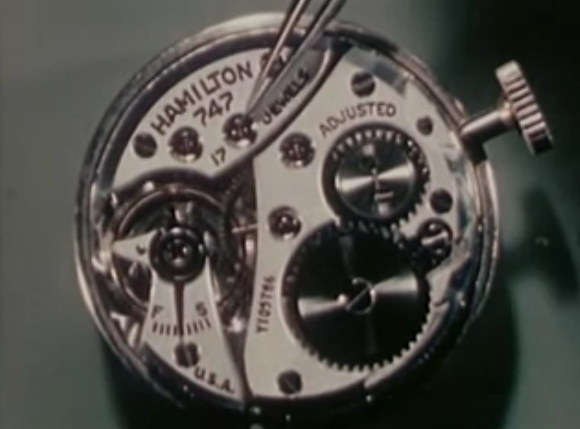
Anyone who has ever tried to keep time with an electronic project will have respect for a timepiece that stays accurate over the span of months or more. We think it’s even more respectable when it comes to mechanical watches. This video was made by the Hamilton watch company back in 1949 to explain the basic processes behind a precision mechanical timepiece.
It takes several minutes to get to the meat of the presentation, but we think you’ll find the introduction just as entertaining as the explanation itself. When it does come time to look inside the watch a set of large pieces is used to help illustrate the workings of each part. The clip (which is also embedded after the break) does a great job with these demonstrations, but almost immediately you’ll come to realize the complexity wrapped up in an incredibly tiny package. It goes on to explain the low-friction properties that are brought to the table by the jewel bearings. Enjoy!
[Thanks Giuseppe]
















In before the “not a hack” crowd…This is fascinating! Not every post here has to be about repurposing components or bending electronics to the maker’s will. Sometimes it’s nice to just sit back and learn something about the mechanical wonders of yesteryear.
Humor: Ask an American ME graduate anything about this and they won’t know. It’s like reverse engineering and math with CS majors from there, also topology and quantum math with chemical engineering graduates from there…
.. or an EE about vacuum tubes. At some point you have to prioritize what you teach these kids, and keep them up to date with an avalanche of new (and sometimes useless) developments.
How many of us know how to slaughter, skin, gut and butcher a rabbit?
Not many of us, but in the even this knowledge is needed to save ones life it then becomes SUPER practical. I know how to skin an animal from hunting and I have to agree that it’s something everyone should know.
It’s not really necessary for survival. Gut it, spit it, and roast it in the skin. Anyone can figure out how to gut something, given a few tries. Depending on the animal and your tolerance you could even go without in an absolute emergency.
Skinning only becomes necessary if you intend to store it, use more advanced cooking methods, or do it pretty-like.
I know how to do all that to rabbits, deer and most other game animals… it is a skill that could come in handy if you found yourself lost in the wilderness, so it shouldn’t be left in the history books … a lot of old skills are still potentially useful, you just have to want to learn them. not everything hackable is gadget or a tech item…
More Humor:
1. Ask most gun and bow hunters how to trap anything without store bought kits
2. Ask someone who inherited wealth or has a >20k USD salary how much gas or common food costs
3. Ask a US state department worker which days of the week they have off
4. Ask a Russian how to pay a ticket or go to court
4. Ask a typical European where they work, and when they say nowhere, how Americans caused it
5. Ask a person with an expensive watch what time it is and bet money whether it’s wrong or not
I go back and forth from hating and liking you. Like your original comment for instance. It insinuates poor engineering degrees from the US. Yet if you stop to think of the top engineering schools, nearly all of them are in the US and the international enrollment shows this. Not to mention there is something to say about the US being the most productive country on the planet per capita. It truly is a remarkable outlier in that regard. Now here is where it gets interesting. The reason behind that GDP output is the longer working hours, the harshest of first world work expectations. Thus leading to the answer to the curious question of how a country can be massively productive but still have a crap education system? Efficiency is the answer. Americans have far less time. It is in their best interest to teach each other what is only practically applicable and it is in their best interests to learn only what they need to know.
Ohh ohh!! I can add:
1. Ask a typical outdoorsman how to triangulate their position without a GPS.
2. Ask a typical human rights activist why we started tracking ‘collateral damage’.
3. Ask a ME from an upper middle class background how to change a tire without looking at a manual.
4. Ask a CS grad to troubleshoot a computer issue without google.
$20K salary is barely above minimum wage. People making that KNOW how much food/gas costs, because if they make a mistake they will be going without one or the other for the next paycheck.
I can slaughter, skin, gut and butcher a robot.
I do. I grew up hunting and eating them. :)
I can skin and butcher a deer (haven’t done a rabbit in decades, if ever). I have no idea how having this knowledge and experience improves my skill in electronics, but skinning and butchering skill VASTLY improved my massage technique.
In massage therapy, you have to feel different layers of muscles, connective tissue, etc through the skin, scars, and such. Since most people don’t want to be cut open just to let others explore basic body structure, massage therapists don’t get concrete experience with connective tissue.
Actually getting your hands INTO the muscle system of a dead animal for a couple of hours is easily worth several dozen hours of detailed, advanced instruction.
I love these retrotechtacular posts. I don’t always learn something that helps in a specific addition-to-skills fashon, but I almost alwasys find something that enhances prior knowledge.
As an LMT that’s definitely taken a new appreciation to meat and cooking in general, duly noted. Thank you.
So, will you try that and get back to us?
Xorpunk, be careful with the broad reaching claims in you “humor”. They are easily disproved, and more serve the purpose of angering people than of adding to the conversation.
ME here; while it’s true that this isn’t taught in school, I find watchmaking very interesting and as a result have bought broken watched, ripped them to pieces, lost many bits, and wound up with a bunch that work, well, like clockwork. I can’t ever see this being useful for any jobs that I want to wind up in, but it’s fun doing things that I’ve never done before and challenging myself. I can’t even image what life would be like I wasn’t continually challenging myself.
That’s a mesmerizing video.
Why would an ME be taught watchmaking? Materials, machining, mfg processes, fluids, heat transfer, statics, dynamics, robotics, and µ-based design: yes (back in the early 80’s, at least). Basics. Watchmaking? Not so much.
@fluffy: send a Harvard, MIT, Stanford, Berkeley, Yale graduate to a German, Russian, or Chinese primary school, and lets see how intellectually superior they are…
As I said before, even in my country you’re thrown out of school for not knowing at least 3 languages and advanced algebra by by early teens, and we are somewhat inferior…
@daeath: living standards are dictated by cost of living to salary which is usually monthly. 20k is 1,666 USD a month, if you have trouble with that you’re a moron….
@whizbo: disprove it, I’ll just point out how the US lost all of it’s science and engineering industries to foreign nations not long after the advent of computing…
“…even in my country you’re thrown out of school for not knowing at least 3 languages and advanced algebra by by early teens, and we are somewhat inferior…”
Makes you wonder why you need to know 3 languages, then, right?
Considering the cost of shelter in southern California (1bed/1bath apartment in Los Angeles area is $700-1000 a month on average), there is almost no possible way to live in any sort of comfort with a 20k salary. Just one example that I am familiar with.
GDP pretty much invalidates any argument you have over “the industries.” USA GDP is twice that of the next nearest country, China. I suppose the argument could be made, then, that we just steal all our ideas from engineers outside the country. You’d have to look at patents, then, I guess.
I can carve my own wheel from stone! how is that for backward technology!
wowme@wtf.com: yeah who still uses gears and torque transmission?
more American education hard at work… I know.. I know.. it’s me who is ignorant and dumb,,
Wow, that is cool!
if you get a chance watch a TV mini series called “Longitude”, that will put this post into perspective
The most rewarding twenty minutes I will probably spend all day, perhaps the rest of the week! (And I realize my time measurement isn’t quite as accurate as the watch)
Wow, this was very informative. I can’t help but wonder how it is that we were able to make such precise small parts as early as we did. According to wikipedia we started mass producing “modern” (other than modern materials and precision) watches in the 1800s. Even with much lower tolerances that now, it’s still a very precise set of parts needed relative to the time
Same way they’re made now, most likely, just with less automation of the machinery. Most of the interesting gear and screw manufacturing and lathing processes were invented centuries ago. Also, as someone points out here, you don’t have to worry about gear backlash because all the gears are moving in the same direction. That probably makes it considerably easier.
I love that ending: God bless Americas watch! like were all still using sundials in the rest of the world.
I’m disappointed that they didn’t explain more about how the hairspring/balance wheel sets the time constant. From this you could go into harmonic motion and differential equations.
>differential equations
go. to. hell.
Lurve’n the retrotacular stuf!
I watched this on my cellular phone and took notes in cursive with my fountain pen.